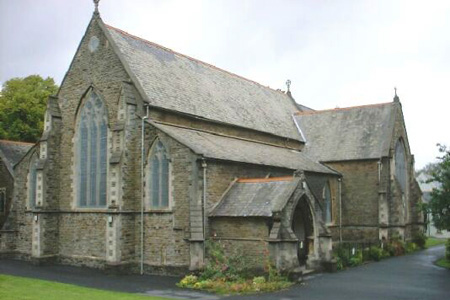 |
||||||||||
 |
||||||||||
|
1437: St James, Uplands, Swansea, Wales Mystery Worshipper: The Ice Man. The church: St James, Uplands, Swansea, Wales. Denomination: The Church in Wales. The building: Fairly straightforward Victorian neo-gothic dating from the 1860s. A well proportioned building, notable for some fine post-war stained glass. The church: A Welsh-language service is held on the first, third and fifth Sundays of the month. They have a youth group, mothers' union, Guides and Rangers, and a fellowship group. The neighbourhood: Uplands is a typically Victorian suburb on the western side of Swansea, and is relatively prosperous. It is close to Swansea University, with a fairly high student population. The poet Dylan Thomas was born here. Noteworthy is the fact that most of Uplands' shops are locally run, not dominated by the chains. The cast: The service was led by the verger, Mr Tony Weekes. The Revd Dr Duncan Walker, vicar, preached the sermon. The date & time: Sunday, 27 May 2007, 4.00pm. What was the name of the service? Evensong with Ministry of Healing. How full was the building? There were 12 people in the congregation, and half a dozen in the choir, so the building was fairly empty. Did anyone welcome you personally? Not when I arrived. There was a table by the door with the necessary books and notice sheets on, so I helped myself. The vicar welcomed me as I left the building and tried to interest me in chocolate biscuits (see below). Was your pew comfortable? Fairly average as pews go – it was of the traditional wooden variety. How would you describe the pre-service atmosphere? It was a bit noisy, actually. The organist was competing with the church bell, and several people in front of me were talking to each other. It quieted down a bit immediately before the service started. What were the exact opening words of the service? "Good afternoon, and welcome." What books did the congregation use during the service? Book of Common Prayer (Church in Wales, 1984); Sing to the Lord / Canwch i'r Arglwydd (bilingual Church in Wales hymnbook, 1990). What musical instruments were played? Organ only. Did anything distract you? At the last moment before the service began, a woman came and sat in the pew right behind me, so I felt rather self-conscious as I tried to take notes. I was also a bit distracted by the music the organist played before the service and later during the laying on of hands – let's just say it was at times perhaps more dissonant than the composer intended. Was the worship stiff-upper-lip, happy clappy, or what? The traditional liturgy of the service was done in a simple and dignified manner, clearly borne of reverence, but without a trace of pomposity or self-regard. The tone was generally measured and restrained, although the preacher was a touch more impassioned. Exactly how long was the sermon? 20 minutes. On a scale of 1-10, how good was the preacher? 7 – The vicar spoke well, but I was rather uncomfortable with his claim that God had recently reminded him to pay the gas bill, regularly gave him wake-up calls, and had practically dictated his PhD thesis to him. I got the impression he was being fairly literal. In a nutshell, what was the sermon about? Although all are condemned by the letter of the law, all may be saved by entering into a relationship with God. Our unwillingness to face up to our faults is the chief barrier to that relationship. Turn to the Spirit in all things, both the things of everyday life and as a preparation for eternity. The changes we need to make in our lives require great energy, which is something the Spirit can give us; the Puritans illustrate this. Which part of the service was like being in heaven? The simplicity and sincerity of the way the service was conducted, with the congregation singing the psalm and the canticles to Anglican chant. And which part was like being in... er... the other place? Some people in front of me mistook the moments of silence and the laying on of hands as an opportunity to talk to each other. I found this quite undermining of the atmosphere. The vicar's remarks during the sermon also seemed odd. What happened when you hung around after the service looking lost? Very little. People moved out of the church quickly after the end of the service; not wanting to be left in an empty church, I did likewise. The vicar greeted us in the porch. How would you describe the after-service coffee? The vicar mentioned that tea and chocolate biscuits would be served in the church hall. However, it appeared that half of the already small congregation had decided to pass these up, and so I thought it best not to let myself be tempted. How would you feel about making this church your regular (where 10 = ecstatic, 0 = terminal)? 3 – The dignity of the worship was striking and most welcome, but I was depressed by the size of the congregation. Did the service make you feel glad to be a Christian? Sort of. What one thing will you remember about all this in seven days' time? God telling the vicar to pay the gas bill. |
|
|
||||||||||||||||||||||||||||||||||||
| More Mystery Worshipper reports | |||||||||||||||||||||||||||||||||||||||
 |
|||||||||||||||||||||||||||||||||||||||






